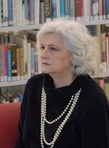Vicki Olsen's Blog: Vicki Olsen - Recommends..., page 2
May 29, 2021
Don’t Underestimate the Men in Skirts
THIS week marks the anniversary of the Dunkirk evacuations – hailed as
the miraculous rescue of troops during World War Two. If you saw
Christopher Nolan’s 2017 movie Dunkirk
you didn’t see the whole story. The Dunkirk evacuations, which began on 27 May, were spun into tales of an incredible victory; 338,000 Allied soldiers were snatched to safety. Meanwhile, a further 220,000 Allied troops were rescued by British ships from Cherbourg, Saint-Malo, Brest, and Saint-Nazaire, bringing the total of Allied troops evacuated to 558,000. Dunkirk was a huge achievement and it had to be portrayed as a victory and as a success to boost the morale of the British people and capture the nation’s imagination. That was the good news.
What politicians were not going to start telling was the bad news. While eight times more men had been saved than thought possible, what you didn’t see was the story of the thousands of French soldiers left standing on the beach to be captured by the German forces or the British 51st Highland Division ordered to join the battered French forces and stop the German’s advance when the operation ended on June 4.
Over the next week, the French and the Highlanders continued to fight against
impossible odds at the Battle of St Valery. In the end, around 10,000 men being captured by the Germans led by General Erwin Rommel.
Follow my links to get the entire story. They tell it much better than I can.
One of the French soldiers at the Battle of St Valery was Dr. Edmond Caillard . Dr. Caillard plays an important role in my book The Duty of Memory
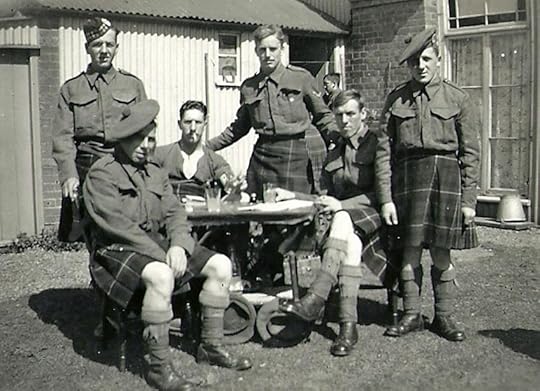
The Other Dunkirk - 51st Highland Division Last Stand - Battle of St Valery
“Les hommes en jupons de femmes.”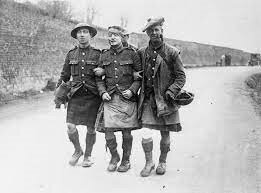
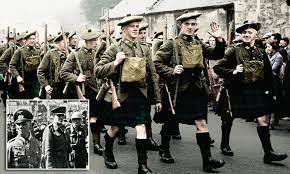
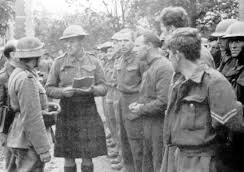
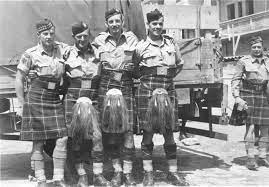
March 5, 2021
The Brother's Karamazov - My third attempt
Wish me luck!
September 27, 2020
Le Massacre a Paradis
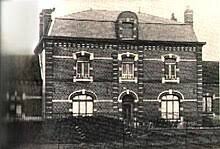
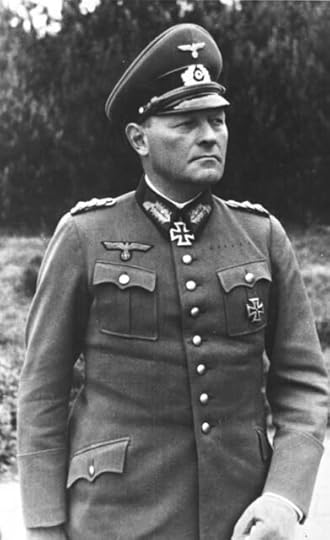
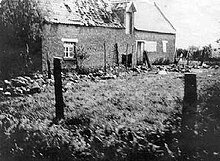
Le Devoir de Memoire, the duty to remember, a concept born after the Second World War, is a common notion in France, where the memory of the German Occupation and, more generally, World War II is still very much alive.
The concept mandates the moral obligation to remember a tragic historical event and its victims, in order to ensure that an event of this type does not happen again.
With the last remaining actors and eyewitnesses to these events now in their 80’s and 90’s it is now up to the efforts of associations and local authorities to erect commemorative monuments, organize pilgrimages for the recollection of the families of the victims and provide information in order to assure the cry of “never again!” is still loud and clear within the collective memory of the French population and the world.
This video demonstrates what Le Devoir de Memorie is about the video is in French and English. It captures the essence of the union of England and France to remember this historic event.
Here is a link to the Wikipedia article on the Massacre at Paradis
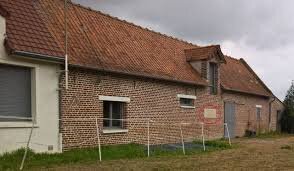
July 30, 2020
Today's thoughts- The Battle of France after Dunkerque
 May 10, 1940 – Jun 25, 1940
May 10, 1940 – Jun 25, 1940Today I am writing about the continuation of the Battle of France. Popular history leaves many to believe the battle was over at 03:40 on the night of 3/4 June 1940 when the last ship left Dunkirk.
But sixty remaining French divisions and two British divisions made a determined stand on the Somme and Aisne.
J'écris sur la bataille de France. L'histoire populaire suggère que la bataille était terminée dans la nuit du 3/4 juin 1940, avec le dernier navire à quitter Dunkerque.
Mais soixante divisions françaises restantes et deux divisions britanniques prirent une position résolue sur la Somme et l'Aisne.
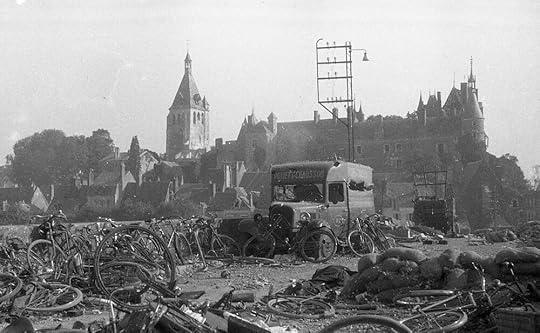
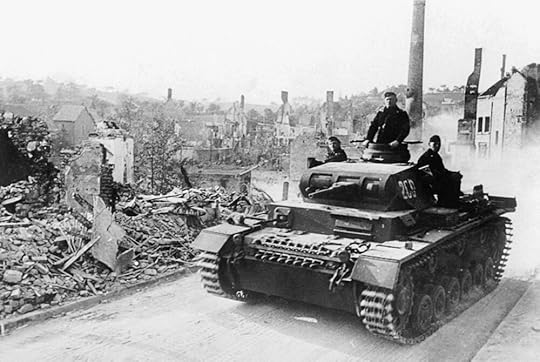
April 8, 2020
HALF-WAY THERE? NOT REALLY!
We are all currently “sheltering in place” because of the Coronavirus. Yesterday I got sad news from France. One of the main contributors to my source material just lost his 94-year-old paternal grandmother to the virus. In reflecting on this, I realized that she was a contemporary of the characters in Duty of Memory. So few of that generation are left to tell the story. The realization hits me with an urgency to finish telling this story. So many times while writing a passage, I say out loud, “ I wish Daddy was here so he could answer my questions.” Since I began researching the novel almost three years ago, we have lost two of the eyewitnesses to his story that I met in 2017. Lost with them is the chance to hear the story from those who were actually there.
So many of the WW2 veterans, including my father, didn’t talk much about the war. As a result, there are many families who don’t know the personal stories.
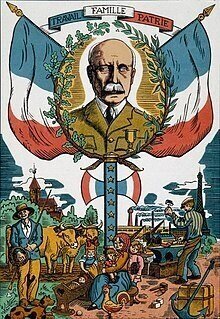
The French experience during the war was unique. Because of the Armistice following the Battle of France it became a divided country. There was almost a civil war atmosphere with the division between the occupied zone of northern France and the Nazi collaborators of the Vichy Government to the south. In retrospect, it is easy to see the Vichy Government as the '“bad guys,” and perhaps they were.
But put yourself there, and ask yourself: what would you really do? Would you resist or collaborate?
Watch Louis Malle’s film Lacombe, Lucien (1974) and then ask yourself the question again.
A clock strikes somewhere.
He starts, rouses himself. “What! can it be that late? Impossible, it must be fast!” Drawing a breath, George Jauneau raises his head and looks out the window. Seeing the darkness gathering, he quickly clears his workstation and hurries away, locking the door of the laboratory behind him.
As he rushes from the Weeks factory building, he meets no one; all the doors are shut and the stairs are deserted. This is not an unusual situation for George as he leaves work. Ever since the Parlement français had bowed to pressure from the workers and enacted a law limiting the work week to 40 hours, he is often the last to leave the building. The 33-year-old activist smirks at the irony. He had campaigned hard, alongside his father, in the Radical Socialist Party movement to get this enacted; nonetheless he enjoys his work as a chemical engineer, and he has no wife to hurry home to. But tonight, he has a soupçon of escape from his familiar solitude—a business meeting—communist business.
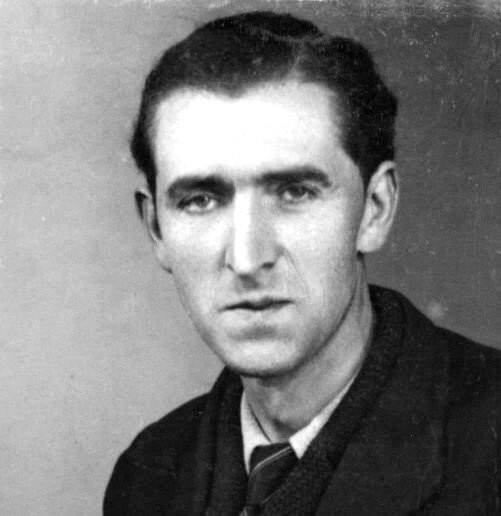
He walks out into the streets just as shop windows are beginning to glow. Picking his way to the bistro, preoccupied with many thoughts, he stops and stands motionless for a few moments, without being aware of it. The people who pass along the sidewalk, moving vaguely under the trees, are only shadows with muffled voices, silhouetted in the pale glow of streetlamp globes.
When he reaches the corner at the juncture of the sidewalk that leads to the door of the bistro, he stops again, “Ah, I wish I knew,” he whispers pensively. “I do wish I knew what she thinks of me.” He stands for more than a minute and with studied deliberation he critically views the reflection of his sharp features and high cheekbones in a café window.
He is fond of making fun of his own face, particularly his conspicuously aquiline nose, though, in truth, he seems proud of it, especially when he receives one of the frequent comparisons to the British actor, Basil Rathbone. “A regular Roman nose,” he would say, “I’ve the countenance of an ancient Roman patrician of the decadent period.” His prominent Adam’s apple would bob below his sharp chin, and his lips, as thin as two threads, would curl into an infrequent, crooked smile; that smile that seldom reaches his small, quick eyes, shining like two bright points. There is something suspicious, and ironical in those eyes; something which gives him an ominous and portentous appearance.
He passes a hand over his cheek and rubs the network of fine wrinkles around his eyes. “They make me look older than I am. Do I look as if I am her father?” He shrugs, picks an imaginary hair off his lapel and resumes his journey to the bistro.
The hammering of his heart builds as he pushes open the door, and after an instant's hesitation, enters the smoke-filled room, thick with the smell of perfume and perspiration. As expected, he finds it crowded with noisy customers laughing boisterously.
He turns sideways to work his way across the bare floors of the long, narrow room. Pushing through the crush, bumping into knots of people clustered here and there as he goes. He brushes past a group of students, a couple of smartly dressed women sipping glasses of wine, and a pair of low-voiced lovers whose coffee cups remain untouched on an iron-legged table topped with bare marble, yellowed with age and use. A sense of unreality wells inside. Years ago, it had been his habit to escape into the anonymity of a crowd such as this—souls with no real home life—living in the bistros, rendezvous with their friends to gossip and drink infinite bottles of wine. One can find these people in every bistro and café in every city. But he no longer looks for that kind of retreat.
Above the sound of the crowd he hears the voice of his friend, Jean Crouet, call his name. “Georges.” He waves. “Over here.”
Above is the opening of a chapter I wrote yesterday about a real-life character, Georges Jauneau. He was a communist. I grew up in a time when Americans feared nothing more than communist. But Georges Jauneau was a hero of the French Resistance. In fact, a lot of heroes of the French Resistance were communist. I grew up in a time when Americans viewed French Resistants as heroes.
Duty of Memory is a book about the real people behind the French experience of WW2. I hope I can do it justice.
This week, I reached a word count of 51K. My goal is to have a first draft of around 100K, with the goal of editing it down to around 90K. So my first draft is 50% finished. But most of the hard work comes during the editing process. With the first draft, I can pretty much write with abandon—let my characters go where they want. But in the edits, I have to, as Stephen King says, “kill my darlings.” No matter how much I might love a sentence, a paragraph or even a character, if it doesn’t work for the story, it has to go. Je suis triste.
March 24, 2020
Possibly the Youngest French Resistant
In September 2019 my brother Michael and I made the trip to France again. this time we were joined by Kathleen Argenta, the daughter of Joe Houlihan and Bob Edge, the son of William Edge. Sharing this experience with the children of my father’s crew mates and fellow evadees added to the poignancy of the experience. In the picture to the right, we are standing in the same location as the photo my brother Michael is holding. Lucien Bertin, at the far left is the only living survivor of the original photo. What a thrill to have him pose with us. He was able to join us on this visit as well as our 2017 visit. He was only 17 in 1944. Joe Houlihan was 19.
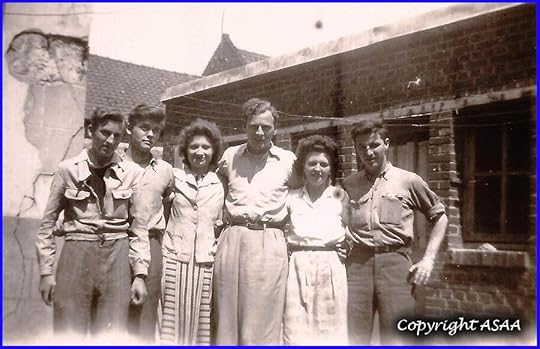
Saint Just-en-Chaussée - June 1944 - At Paul Begue and Yvonne Fossier's home.
From left to right : Lucien Bertin, Joseph Houlihan, Yvonne Fossier, Louis Watts, Suzanne Lequien, William Edge.
The True story On 3rd July 1944, the Gestapo and about 300 SS soldiers surrounded the bottom of the Rue de Paris and the home of Yvonne Fossier where William Edge was still located. William Edge and Paul Bègue shut themselves up in a rabbit hutch for nearly two hours in order to escape arrest.
That's when their neighbor Suzanne Lequien came in. She had the audacity and bravery to extract William Edge from the trap by hiding him in the bottom of a baby pram, with Yvonne Fossier's daughter, Paulette, 18 months old, over him. Right under the noses of the Germans she then took him to a safe place at the house of Paul Bègue's sister, a little further down the same street.
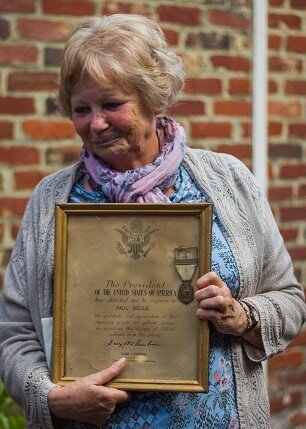
Paulette showing the French Commemorative War Medal and the US Prsedent’s certificate of gratitude awarded to her father for his Aid to American Airmen. Her pride shows in her face.
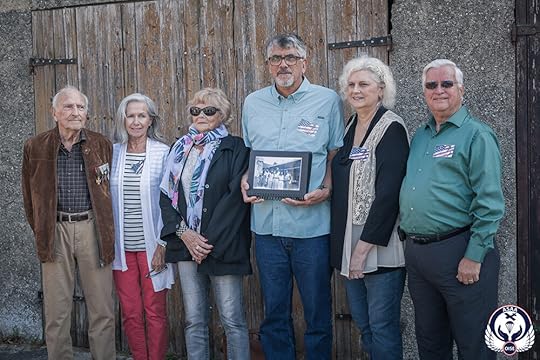
Replica of June 1944 photo ... 75 years later ! From left to right : Lucien Bertin, Kathleen Argentina: daughter of Joe Houlihan, Paulette (Begue): Daughter of Yvonne Fossier, Michael Watts & Vicki Olsen: children of Louis I Watts and Bob Edge:son of Wiliam Edge
One of the most interesting stories surrounding this stop on our “in our fathers’ footsteps tour” is Paulette’s involuntary role in the resistance. "I obviously do not remember because I was only 18 months old. It is to my mother and her friends that all the credit must be given ... " Paulette timidly declared. In photo below Bob Edge holds a photo of Paulette in her baby carriage. Suzanne Lequien hid Bob’s father in the bottom of the baby carriage, covered him with baby blankets and sat Paulette on top in order to sneak him past the German’s. This was a very moving moment. Bob had no idea he would meet the baby who starred in the story his father had told of the event. I suspect there will be some who will think I made this one up when they read about it in the book. The truth is stranger than fiction.
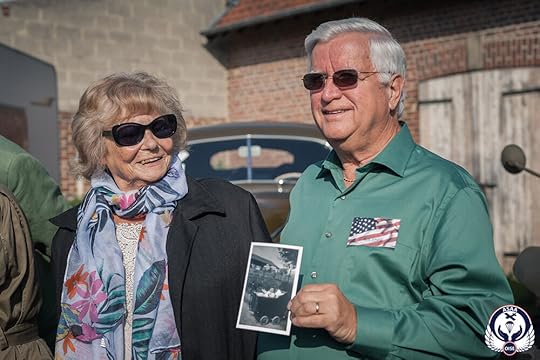
March 10, 2020
The Tailor - Bruno Radziminski
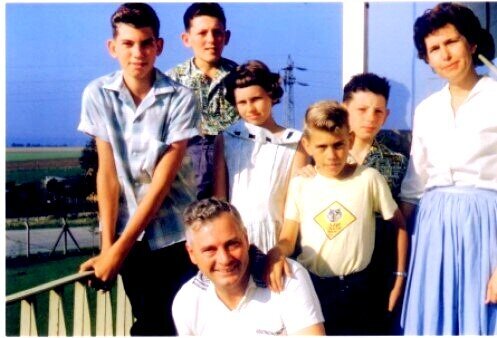
L-R My brother Louis, Michel, Me my brother Michael,Daniel, My mother and kneeling is my father
In the fall of 1958 our family sat around the dinner table discussing what overseas assignment my father should ask for. It was time for his foreign rotation and he could put in a request for a station. My mother and I voted for Hawaii. My brothers wanted Alaska. Remember that in 1958 neither Alaska or Hawaii was a state, so these were overseas assignments. I don’t know what Daddy actually put in for, but I suspect it was neither of the two. He got orders to report to Wiesbaden, Germany in January 1959.
While there, we went to France to visit my father’s wartime friend, Bruno Radziminski. I had some vague recollections of stories my father told us about the time he spent with the French Underground during the Big War. It all sounded romantic and somewhat sinister...but it was something that had taken place in the “olden days” some fifteen years earlier. I certainly had no interest in listening to a couple of old guys reminisce after drinking a few glasses of wine. I also recalled hearing my father’s spirited singing of Le Marseilles after similar indulgence in wine at the office parties he hosted at our house in Idaho. Fortunately for me, Bruno and his wife, Marguerite had two sons about my age. Michel was 13, Daniel was 11 and I was 10. They spoke no English and I spoke no French. Daddy was too busy drinking wine and singing with Bruno to act as interpreter, but he did give me and my brothers a French/English dictionary and sent us out to play. No worries. With that dictionary and a lot of sign language we had a great time…even went to the movies. And I developed my first serious crush. Ten year old me wanted to marry 13 year old Michel. Notice how I am snuggled up to him in the photo.
Now that I am old and my parents are no longer around to tell the stories I so much would like to hear, I wish I had paid more attention to Bruno and Daddy, instead of mooning over Michel. But all is not lost. In 2017 my family reunited with the Radziminski family and I spent a week at the home of Daniel and his wife Gwenael hearing stories about Bruno. I use Bruno as the narrator of the book, so I returned in the fall of 2019 for a much longer stay to gather even more stories from Daniel. In the tradition of our fathers, we drank a few dozen bottles of wine as well. The bonus is that Daniel is a gourmet cook and a wine connoisseur. His home is on the Atlantic coast of the Vendée region and we had fresh seafood everyday. I even gave in and ate mussels and snails…as well as a few things he refused to identify as anything other than “meat.”
A wonderful French organization:Association of Sauveteurs of Aviatorians Alliés - Association of Allied Aviator Rescuers, is working to preserve that history before it is all lost. We will never be able to capture those details the other generation could have given us, but at least the story is still there for us. It is with the help of their President Dominique Lecomte and their researcher Franck Signorile that I am able to gather the information to write Devoir de Memorie.
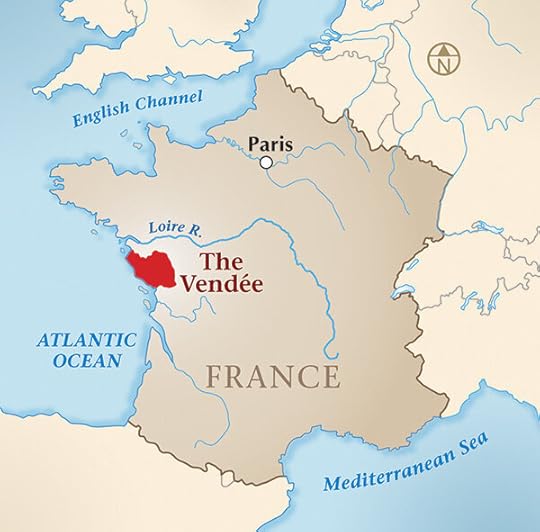
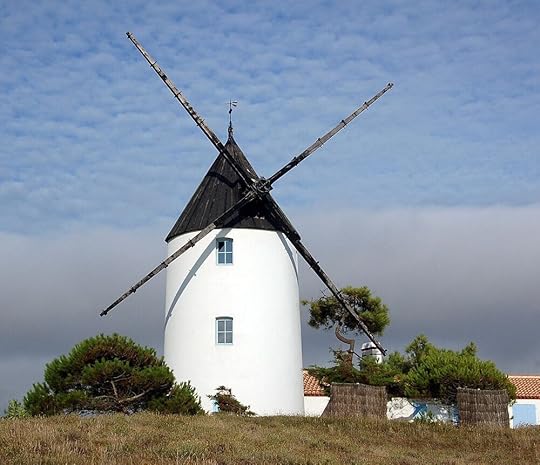
January 8, 2020
The Road to the First Page
It took 5 years to write Sparrow. I hope to finish Duty in less than a year. I returned from my recent 90 days in Europe with 50 pages of hand written notes and all kinds of thoughts bouncing around my head…and a title for my next novel…Le Devoir de Mémoire—the Duty of Memory. I also had a few day-dreams about the cover. Hint: it will include the handsome young man in the photo on the right.
This project started in my mind more than 2 years ago when our family was contacted, via social media, by a young man in France, Pascal Pollet. He was gathering information on his grandfather. He told us his mother wanted to know more about her father. He died when she was only 6, so she never got to know him. What is the connection? Pascal’s grandfather, Juste Desesquelles was a member of the French Resistance and he was a member of the network the helped my father evade capture by the Nazis after his plane was shot down over France on May 10, 1944.
It all started with this email to my sister-in-law:
Hello Mrs Watts,
My name is Franck. I live in Paris, France. I am currently researching the WW2 story of two American airmen who were shot down over France in 1944 : Louis Watts and Joseph Houlihan. Louis Watts enlisted in the US Army Air Forces and joined the 394th bomb group on the European theater. He has lived in Little Rock, Arkansas, and passed away in 1984.
If that person is not a member of your family, please ignore this message with my apologies.
If he is, you might wonder why I am trying to get in touch with his family. One of my friend's grandfather was a member of the French resistance during ww2. We have recently discovered that Louis Watts and Joseph Houlihan had been helped by a number of people in France and had managed to avoid capture by the Germans thanks to these people. Pascal's grandfather was one of these men.
For several months, Pascal and I have been researching the evasion story of these two airmen and we are getting to a point where contacting families and sharing what we have found makes sense, if this is of any interest to the family.
As a long-time LinkedIn member, I know that this type of request is definitely not proper use of a professional social network. But I sincerely hope you will find interest in our research project.
Best regards,
Franck Signorile

Learn More About Their Mission Here
After a few emails back and forth exchanging information on WWII events, we found that Pascal had also managed to find the families of two of my father’s crew-mates who were also helped by his grandfather. Pascal was aided in his search for information by a wonderful organization in France, ASAA Association des Sauveteurs d'Aviateurs Alliés. Their mission is to collect the history of the Allied airmen shot down in occupied France and of those people of the region who came to aid those aviators. Further, they seek to establish or reestablish links between the families of both the airmen and the rescuers.
Being old and retired with nothing else to do, my brothers, their wives and I decided a trip to France to meet these people seemed like an excellent plan. So, in May of 2017 we packed our bags and took off to France for an experience of a lifetime.
Learn more about our 2017 tripThe B-26 “Marauder” # 42-96058 belonged to the 394th Bomb Group, 585th Bomb Squadron of the 9th Air Force, also called the "Bridge Busters" based in Boreham, Essex, England. The 394th Bomb Group participated in the preparation of the future Landings in Normandy by striking bridges, marshalling yards, airfields and V-weapons sites.
Sgt. William L. EDGE Navigator/Bombardier Evaded then POW Tuscaloosa, Alabama
S/Sgt. Louis I. WATTS Radio-operator Evaded Little Rock, Arkansas
Pvt. Joseph J. HOULIHAN Tail gunner Evaded Philadelphia, Pennsylvania
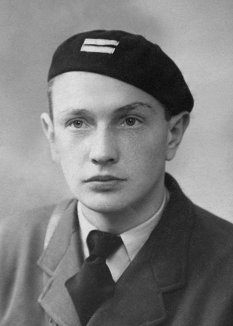
Juste Desesquelles
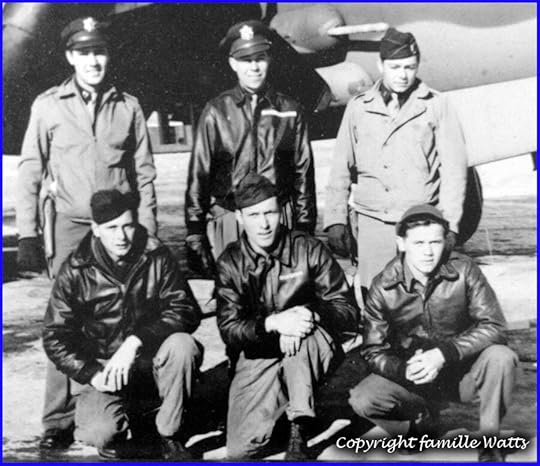
The crew of the B-26 #42-96058 ( my Father is lower Left in this photo)
Capt. James A. JOY Pilot POW Edinburg, Texas
2nd Lt. John O. JOHNSON Copilot POW Oklahoma
S/Sgt. Harold J. MAYNARD Enginner POW Racine, Wisconsin
December 7, 2018
The Former Chief Executive
The plot, incorporating many layers, played out through the interactions a cast of interesting and well-drawn characters is aided by the multiple points of view used.
The pacing starts slowly as the reader gets gradual insight into the lives, the internal complexities, and flaws of these ordinary people. Then it builds with breathtaking speed and comes to a dramatic, Hitchcockian conclusion.
I recommend this book to anyone who enjoys introspective character studies, dramatic irony and breathtaking endings that stay with you for a while as you fully digest the nuanced drama of ordinary life.
Vicki Olsen - Recommends...
- Vicki Olsen's profile
- 358 followers


